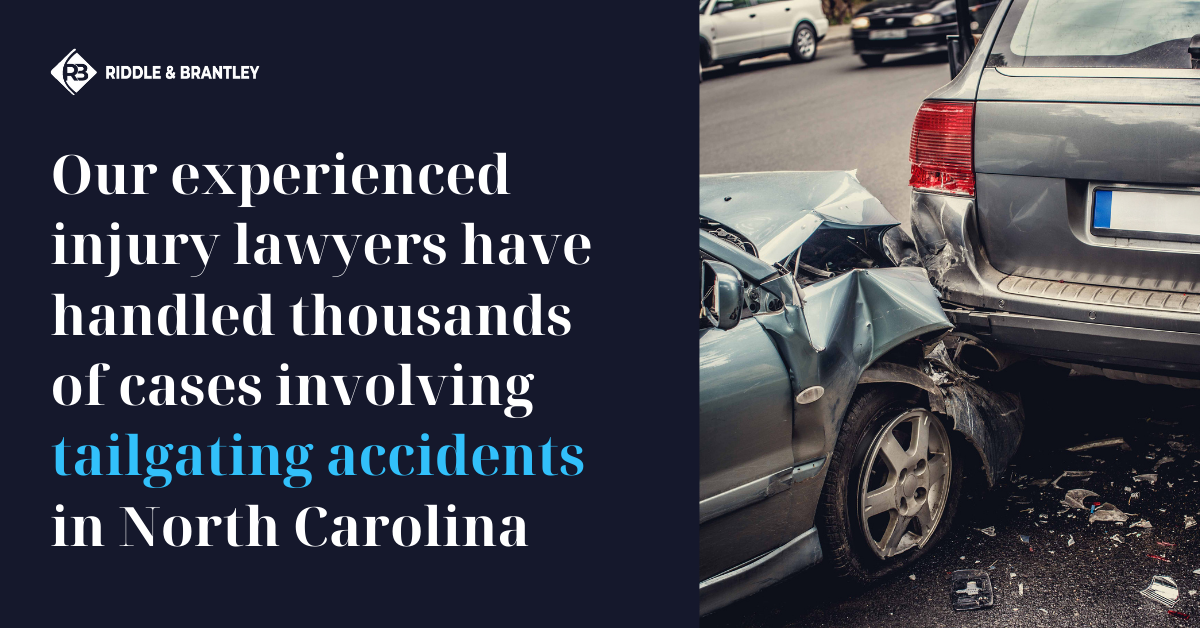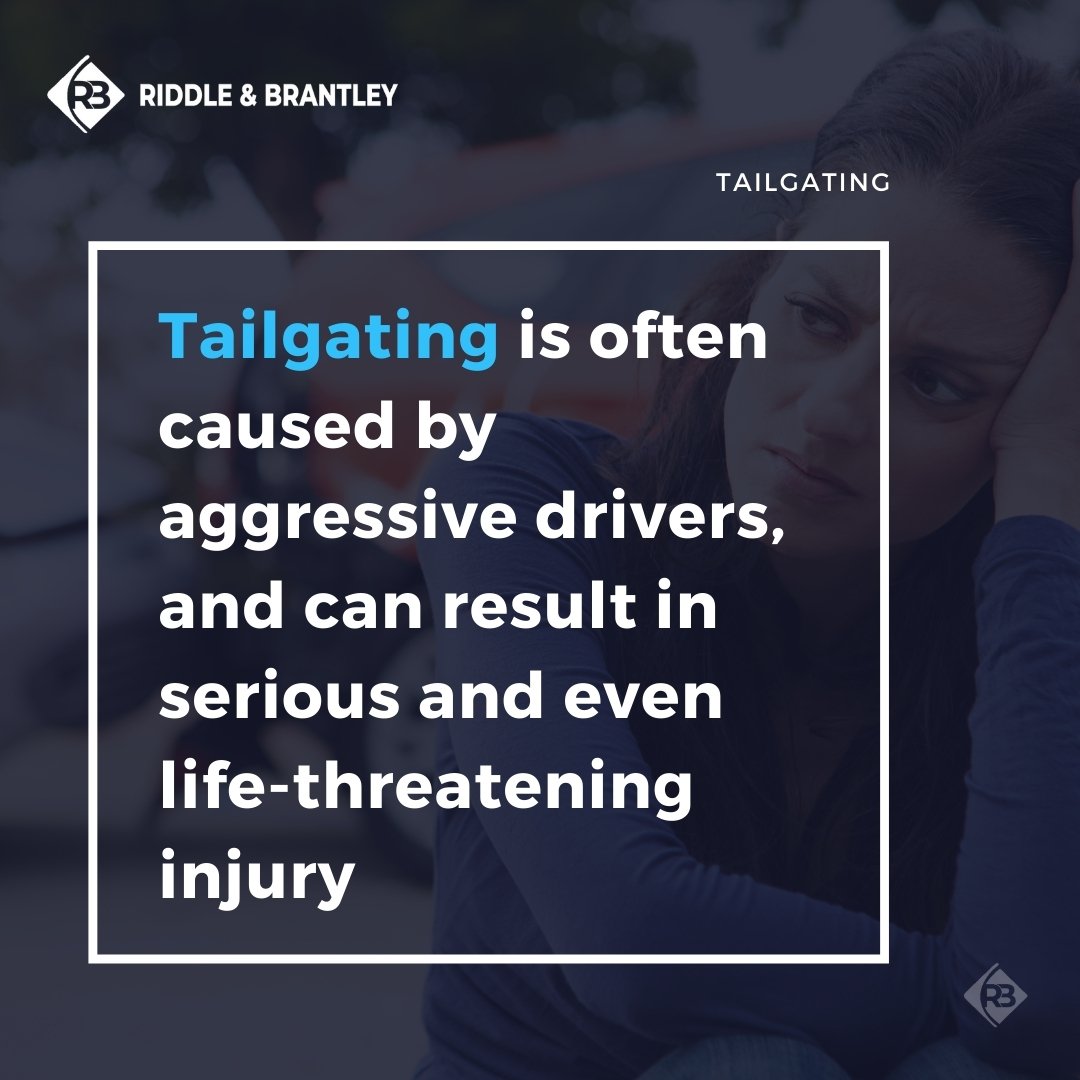North Carolina Tailgating Accidents
Tailgating is defined as one driver following another too closely. This is often the result of driver negligence, recklessness, or even aggression. According to the North Carolina Department of Transportation (NCDOT), tailgating causes over 5,800 motor vehicle accidents in North Carolina every year. North Carolina General Statute Section 20-152 states explicitly that a “driver shall not follow another vehicle more closely than is reasonable and prudent, and shall leave sufficient space for an overtaking vehicle to enter and occupy space without danger.”
 Our attorneys have handled many cases involving tailgating accidents and we would love to help however we can.
Our attorneys have handled many cases involving tailgating accidents and we would love to help however we can.
Rear-End Crashes Are Typical Results of Tailgating
Our car accident lawyers at Riddle & Brantley have found that following too closely often results in rear-end collisions since the tailgating driver may be unable to stop in time to prevent a crash. Aggressive tailgating can also result in other types of car accidents in North Carolina if either driver loses control of their vehicle or swerves to avoid hitting an object.
If you or a loved one have been injured or killed in a truck accident or car accident because a driver was following too closely, then you could be eligible to pursue compensation in a personal injury or wrongful death lawsuit.
What Causes A Tailgating Accident?
Typically, tailgaters are aggressive drivers, but sometimes other elements are factors in a tailgating crash.
Some of the most common causes of tailgating include:
- Road rage and reckless or aggressive driving
- Drunk driving
- Ignorance of safe traveling distance
- Driving while drowsy or fatigued, or even falling asleep at the wheel
- Distracted driving
- Impatience, often resulting from lateness or traffic congestion
- Texting while driving
“What Should I Do If a Negligent Driver Is Tailgating My Car?”
 The best way to avoid an accident is to make way for the aggressive driver. North Carolina prohibits aggressive driving in General Statute Section 20-141.6. If the driver pleads guilty or is convicted of aggressive driving, then we can use this to prove liability in your car crash case.
The best way to avoid an accident is to make way for the aggressive driver. North Carolina prohibits aggressive driving in General Statute Section 20-141.6. If the driver pleads guilty or is convicted of aggressive driving, then we can use this to prove liability in your car crash case.
Although it may be tempting to try to punish an aggressive or negligent driver for following too close by blocking their way, slowing down, or slamming on the brakes, this type of behavior is negligent as well. Aside from the potential for an accident, you could incite more anger in the aggressive driver.
North Carolina drivers should take precautions to avoid becoming a victim in motor vehicle accidents caused by tailgating.
If a driver is tailgating your car, you should:
- Change lanes to avoid them, if possible.
- If you cannot change lanes, then brake slowly. This will encourage them to pass you and minimize your risk of a rear-end car accident.
- If they do not pass, then pull off the road as soon as you can safely do so.
- When you are safe, you may call the police and make a report about the driver if you believe they are endangering everyone on the road.
How Much Space Should There Be Between Cars?
Maintaining a safe following distance is crucial. Drivers should keep a distance of 10 feet from the car in front of them for every 10 miles per hour of speed. That means on highways where speed limits are 65 mph– you should leave 65 feet between you and the car ahead.
The consultation is free and we don’t get paid unless you do. If we don’t recover compensation for you, you won’t pay any attorney fees.
How To Prove Your Tailgate Crash Claim
Proving liability in a tailgating accident can be complicated. At Riddle & Brantley, we have a team of retired law enforcement officers on staff to help lead comprehensive crash investigations and strengthen our clients’ cases.
To hold the other person liable for negligent driving, you must prove the following:
- That driver owed you a duty of care. This standard will be easily met since you were driving on public roadways.
- The other driver breached this duty by behaving unreasonably or not following local traffic laws. Drivers that tailgate other vehicles are clearly breaching this duty of care.
- You were injured in that accident. This may take the form of a head, neck, back, or spine injury caused by the whiplash motion of a typical rear-end tailgating accident, or it could involve broken bones, airbag injuries, lacerations, disfigurement, paralysis, or other injury.
How Long Does It Take for a Vehicle To Stop?
Tailgating is dangerous because vehicles are heavy, and it takes time and distance to slow down or come to a complete stop. Factors that help determine how long it will take a vehicle to stop include:
- Speed
- The driver’s reflexes
- Whether the driver is under the influence of drugs or alcohol
- The driver’s alertness
- The size and weight of the vehicle
- Road and weather conditions
- Whether the vehicle’s brakes are functioning properly
What Can an Attorney Do for You?
At Riddle & Brantley, we understand the frustration of having been hit by an aggressive driver. We are dedicated to fighting for justice for drivers who have been injured in tailgating accidents. We can gather the evidence necessary to support your case and help ensure you get the compensation you deserve from the negligent driver.
Justice for Victims of Tailgating Accidents in North Carolina
Our tailgating accident injury lawyers have more than 220+ years of combined experience, and we believe Justice Counts. You are not alone in your battle, and we may be able to help you. In one recent case, a client of ours was stopped at a red light and was rear-ended, causing a lumbar disc herniation, a bulging disc, and nerve replacement, which required surgery. Our car accident attorneys at Riddle & Brantley recovered a $296,000 settlement on her behalf (see disclaimer below).
“Riddle & Brantley is a version of the Legal Dream Team.”
—Elizabeth Ramos, Riddle & Brantley client
No Attorney Fees Unless We Win Your Case
If you have been injured in a tailgating accident here in North Carolina, contact Riddle & Brantley for a FREE, no-obligation consultation. You will not pay any attorney fees unless you receive compensation.
Disclaimer: The results mentioned are intended to illustrate the type of cases handled by the firm. These results do not guarantee a similar outcome, and they should not be construed to constitute a promise or guarantee of a particular result in any particular case. Every case is different, and the outcome of any case depends upon a variety of factors unique to that case.